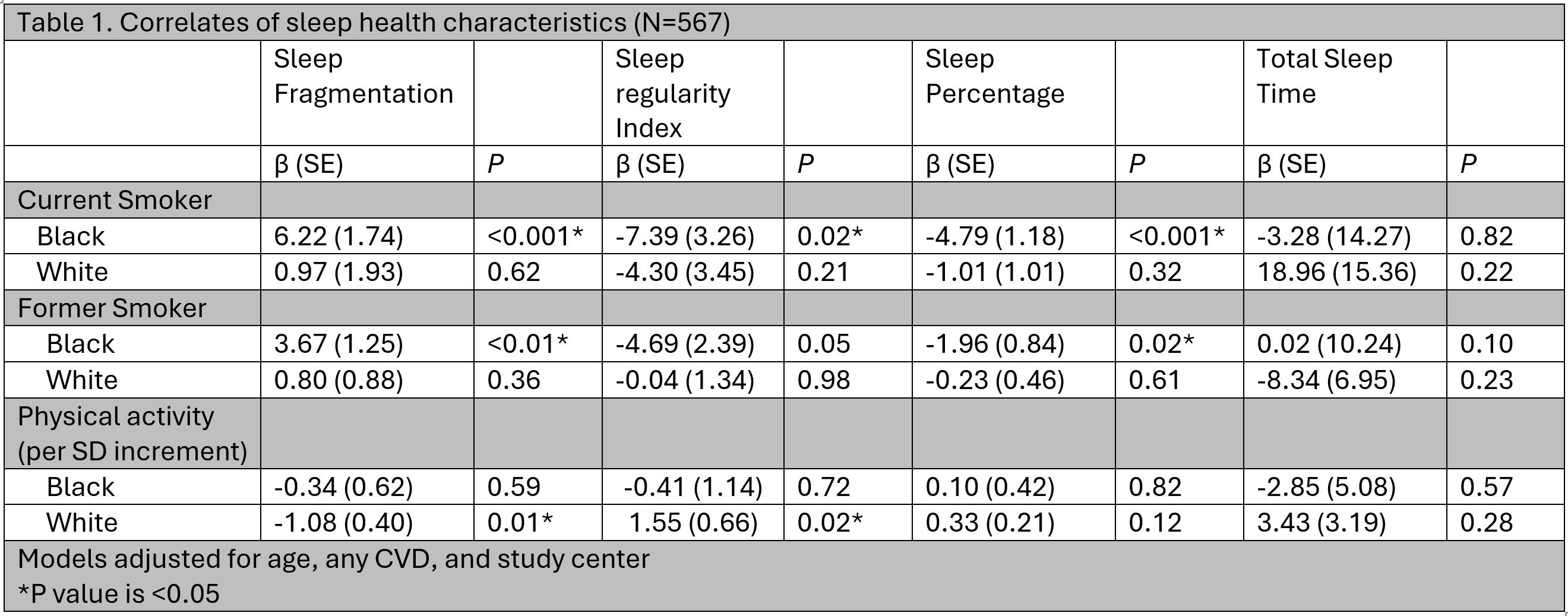Final ID: P2153
Correlates of Sleep Health in Women of the Coronary Artery Risk Development in Young Adults (CARDIA) Study
Abstract Body: INTRODUCTION: The American Heart Association recently added sleep to Life’s Essential 8 key measures for cardiovascular health. As middle age is a period when women’s risk for cardiovascular disease increases, we investigated the contributions of sociodemographic, biological, mental and lifestyle characteristics on sleep health among middle-aged women.
HYPOTHESIS: Adverse levels of these characteristics are associated with poorer sleep health and associations will vary by domain of sleep.
METHODS: We analyzed correlates of sleep health of 567 women using cross-sectional data from the Coronary Artery Risk Development in Young Adults sleep ancillary study at year 35, a prospective cohort study which enrolled Black and White individuals aged 18 to 30 years at baseline (1985-86). Outcomes were sleep regularity index, fragmentation, duration, and sleep percentage determined using the wrist-worn ActiwatchTM accelerometer. Values for each participant were averaged across the number of days they wore the device (min 4, max 7). The following categories of correlates were measured using questionnaires and examinations: sociodemographic (marital status, education, number of people in household, having a bed partner, retirement status); biological (BMI, waist circumference, menopausal symptoms); mental (social support, quality of life, depression, loneliness, social network); lifestyle (physical activity, alcohol use, smoking status). We used linear regression models to generate effect estimates for each of the characteristics and the 4 sleep health outcomes adjusted for age, cardiovascular disease and study center. Given known differences in sleep health by race, we chose a priori to carry out stratified analyses by race.
RESULTS: The mean age of participants was 61.3 years (SD= 3.6) and 44.8% were Black. The mean value for sleep percentage was 90.4% (SD=4.5), sleep regularity was 79.7% (SD=11.0), sleep fragmentation was 19.8% (SD =7.4), and sleep duration was 415.8 minutes (SD =59.9). Lifestyle was the only category that was associated with sleep health. Black women who were current or former smokers had less favorable sleep health (Table 1). More physical activity was associated with more favorable sleep health in White women. The characteristics we investigated were not associated with sleep duration.
CONCLUSIONS: We observed a contribution of lifestyle behaviors with measures of sleep health that reflect sleep regularity and quality.
HYPOTHESIS: Adverse levels of these characteristics are associated with poorer sleep health and associations will vary by domain of sleep.
METHODS: We analyzed correlates of sleep health of 567 women using cross-sectional data from the Coronary Artery Risk Development in Young Adults sleep ancillary study at year 35, a prospective cohort study which enrolled Black and White individuals aged 18 to 30 years at baseline (1985-86). Outcomes were sleep regularity index, fragmentation, duration, and sleep percentage determined using the wrist-worn ActiwatchTM accelerometer. Values for each participant were averaged across the number of days they wore the device (min 4, max 7). The following categories of correlates were measured using questionnaires and examinations: sociodemographic (marital status, education, number of people in household, having a bed partner, retirement status); biological (BMI, waist circumference, menopausal symptoms); mental (social support, quality of life, depression, loneliness, social network); lifestyle (physical activity, alcohol use, smoking status). We used linear regression models to generate effect estimates for each of the characteristics and the 4 sleep health outcomes adjusted for age, cardiovascular disease and study center. Given known differences in sleep health by race, we chose a priori to carry out stratified analyses by race.
RESULTS: The mean age of participants was 61.3 years (SD= 3.6) and 44.8% were Black. The mean value for sleep percentage was 90.4% (SD=4.5), sleep regularity was 79.7% (SD=11.0), sleep fragmentation was 19.8% (SD =7.4), and sleep duration was 415.8 minutes (SD =59.9). Lifestyle was the only category that was associated with sleep health. Black women who were current or former smokers had less favorable sleep health (Table 1). More physical activity was associated with more favorable sleep health in White women. The characteristics we investigated were not associated with sleep duration.
CONCLUSIONS: We observed a contribution of lifestyle behaviors with measures of sleep health that reflect sleep regularity and quality.
More abstracts on this topic:
Assessing Racial Disparities in Heart Transplant Allocations Post-2018 Policy Change
Malkani Kabir, Zhang Ruina, Li Han, Ezema Ashley, Steitieh Diala, Purkayastha Subhanik, Kini Vinay
Behavioral Components of Cardiovascular Health and Their Determinants Among Medical Students at the University of Danang, VietnamGiang Hoang Thi Nam, Tho Minh Hieu Le, Truong Thi Anh Nguyet, Nguyen Hung Nguyen, Vu Thanh-huyen

